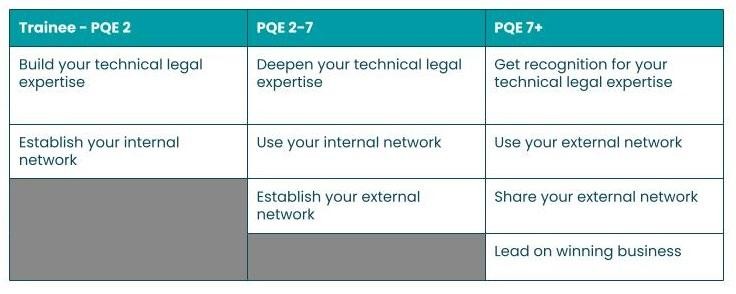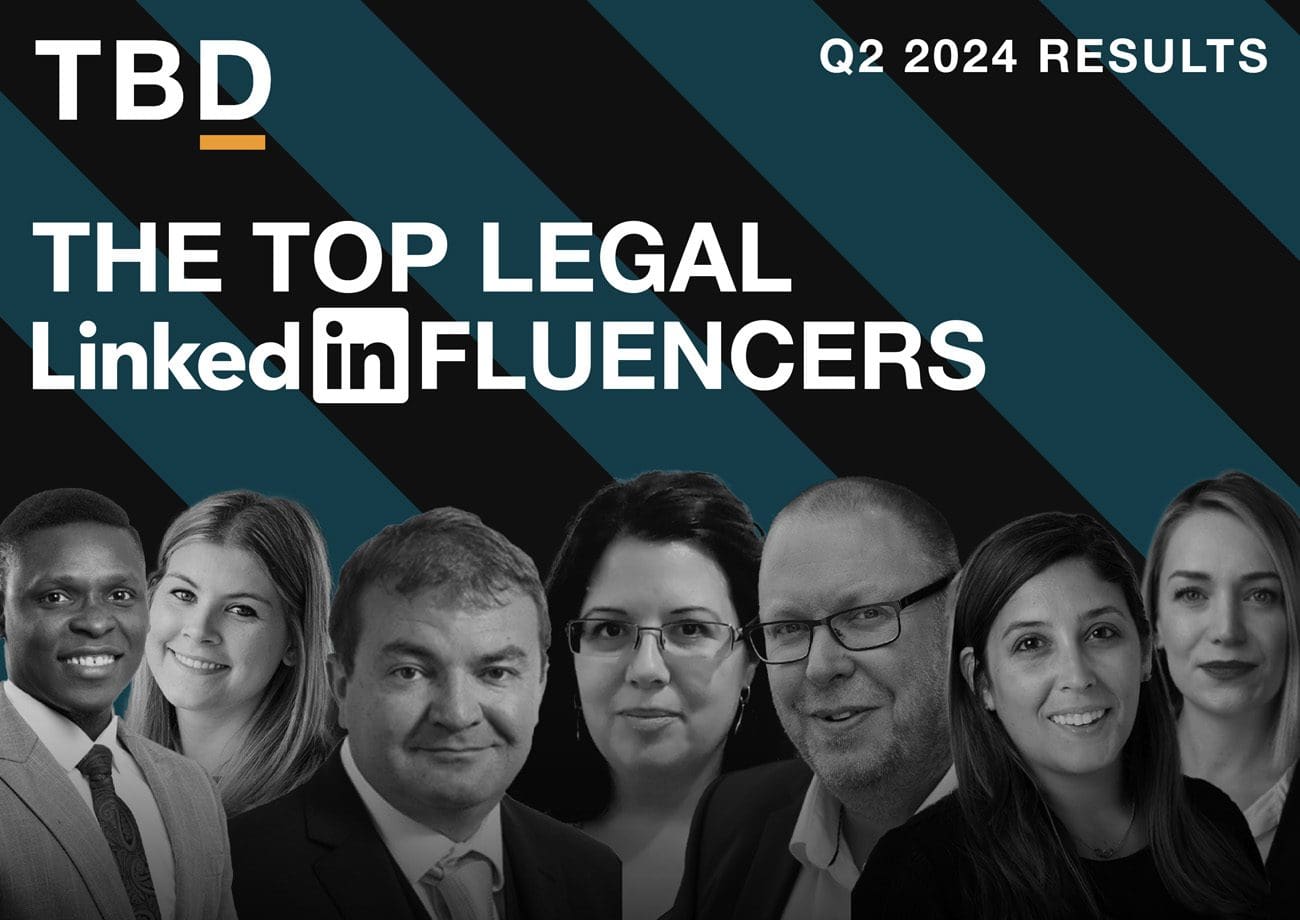A letter of apology…
Dear lawyers,
After many, many recent conversations, it has dawned on me that we, in marketing, owe you an apology.
For far too long, we have collectively failed to be absolutely clear on how to market yourself at each stage of your legal career. A second apology for the fact that we’ve also failed to emphasise just how critically important marketing is to your own progression.
And, as a direct result, we sometimes take on the wrong tasks for you and leave you uncertain as to what’s expected of you in relation to growing your business. We’ve been tactical when we should have been strategic. We’ve been servants when we should have been civil servants.
It ends today.
We promise that from today, we will be clearer about which marketing activities will be done for you, which will be done with you, and which will be done by you.
So, without further ado, I want to rectify this glaring error of omission by giving you the low-down on the marketing disciplines you need to focus on during the three distinct stages of your legal career, the reasons why these activities matter, and the benefits that you will reap as a result.
The three stages of marketing explained

In the above chart, I have outlined the key things you need to concentrate on during the three different stages of your career as a lawyer, from trainee to expert. As you can see, the breadth and depth of marketing-related activities increase as your career progresses.
This may seem counterintuitive to some, as you might expect the necessity of marketing yourself to be greatest at the start of your career, and for this necessity to then gradually wane as you gain ever more traction within the industry.
I would counter this by pointing out that, firstly, your success as a lawyer can only be built on the foundations established during the earlier stages of your career, and that your efforts at this stage must, therefore, necessarily be concentrated rather than diffuse. And, secondly, the growing number of marketing activities throughout your career represents a natural and necessary progression – they will be almost as much a natural byproduct of your success as the fuel that drives it.
So let us look at the different stages in turn, starting with Trainees to PQE2.
The early years
In our current era, aspiring and newly minted lawyers are bombarded with lots of chatter about the need to learn to code, to master AI, to become social media maestros, and a host of other worrying distractions. In my experience, at this stage in their career, that is all that this represents: a distraction. What junior lawyers really need to be focusing on, first and foremost, is learning the law. Thoroughly.
This may seem blindingly obvious, but it bears repeating: your expertise in the law will form the wellspring from which everything else flows. So all you should really be focusing on initially is maxing out on the learning opportunities afforded to you by the different seats as you complete your training contract.
By the time you complete your training, it is, of course, impossible for you to have become an expert in any one practice area. But you will know which area you like, have experienced the personalities and demands of different clients, and also found out which different team members you get on with and enjoy working alongside.
Then, during the next two years, all that really matters is focusing on doing well the tasks that are entrusted to you within the one practice area that you have chosen to specialise in, whether that be corporate, litigation, property, employment, and so on. Learn everything and be a sponge throughout these four years at the start of your legal career to consolidate your technical knowledge.
This is crucially important because, at this stage of your career, one of the two main things that you can really do in terms of progressing your sales and marketing in a way that will make a material difference is to show people that you have properly understood the advances in your area of the law, and to demonstrate empathy for your clients.
You might do so by ghost-writing or co-writing a technical legal update for/with a partner; you might consider writing an evergreen piece containing some more basic information in it; or you might deliver your first presentation to a client.
The other thing that you need to focus on at this early stage of your career is establishing and growing your internal network. It’s quite possible that you will now many of your colleagues for the next 20 or 30 years of your life. This immediate network represents a resource beyond value.
If you can explain to someone within your immediate network what it is that you do for a living, then they can refer work your way when the opportunity arises for them to do so: “You need a complex contentious probate matter sorting out? My friend Jane Doe, who was in the same training cohort as me, is great at that, let me put you in touch with her.” The sooner you become comfortable with networking and master the art of explaining internally to colleagues what it is you do and how you make a difference to clients, the better you will be at doing this externally during the next phase of your career.
Onwards and upwards: PQE 2 – 7
During the next phase of your career, you need to consolidate your legal expertise and really get to grips with what is happening at the cutting edge of your practice area, marrying your technical knowledge with specific industry context.
You also need to start using your internal network and talk about how you are interconnected within the profession: illustrate and demonstrate how you work with and alongside your colleagues. Lawyers who are well-connected – and, crucially, are seen to be thus – get promoted. That is a simple and inescapable fact.
How so? Because at the end of the day, they are better lawyers. Better in the sense that they are more able to solve clients’ problems than a lawyer with fewer connections, because they have an extensive network to refer to and draw on. Clients want and expect a seamless service, which you can deliver when you have close contacts throughout your firm.
At this point in your journey as a lawyer, you also need to forge your external network by talking externally about your expertise and your ability to meet clients’ needs. By the end of PQE7, you should have built something of a reputation externally and established yourself as part of the engine of the firm, driving the business forward – and you can only really do so by engaging with the outside world.
Your external contacts are, therefore, just as important at this point as your internal network: the accountants, the intermediaries, the IFAs, the wealth managers, the pensions providers, the divorce coaches, the marketing specialists (*waves*) – these are the people that you are going to know for the rest of your working life, and it, therefore, behoves you to put the skills that you have learned while networking internally into practice and forge close working relationships with this wide network of professionals who can and will, directly and indirectly, refer work your way.
If you aren’t a natural at this, you can start out by ‘playing’ somewhere safe at first, whether that’s an event with other junior lawyers, or networking groups, or something you go along to with a buddy. But eventually, the training wheels will have to come off and you will need to push yourself out of your comfort zone. And the sooner you get comfortable with doing this, the better you will become at networking externally. Which will help you win work, which will help you build your career, which will help you forge connections, which helps you win work… You get the picture: it’s a big, virtuous cycle that helps to propel you forward and carve out the career you want.
And there is nothing machiavellian about taking a focused approach to networking: it’s all about finding people with whom you have chemistry and rapport and want to work together with, or people who have a need that you can meet. And it’s okay to be nervous about getting involved in networking – but even if you happen to be the most socially awkward lawyer on the planet, what isn’t okay is to let your fear hold you back from putting yourself out there.
Here’s the thing: at PQE 2 and above, you will not continue to win work through your technical mastery alone. Relying solely on technical expertise will mean that your price will be dictated to you by the market.
What makes others instruct you time and again over years and years, and recommend you to others, and pay your bills on time, is human warmth: showing empathy, remembering people’s birthdays, being genuinely interested in how they are getting on and whether there’s anything you can do for them. People will always buy from people, which is why forging relationships matters so damn much. This is at the heart of excellent client service, and no amount of legal brilliance will ever make up for its lack.
The end-game of making partner: PQE 7+
By the time you have advanced to this stage of your career, you should not only be getting all the recognition you deserve for your legal expertise, but also deploying your external network to maximum effect and fronting up the firm’s wins. And you shouldn’t be lacking any confidence in your ability to go out there and take a lead on winning business via your network – all with your eye on the prize of making partner.
Or not. Perhaps you don’t want to make partner. Perhaps you want to move into consultancy instead. Or go in-house. Or leave the law altogether. In any of these scenarios, being great at networking will stand you in excellent stead for the next phase of your career – not least by giving you much greater control in the decision-making process, especially where the step up to partnership is concerned.
But whatever it is you decide to do, don’t be selfish with your network: share it! Love and networks are the only things that multiply in this world, and so by granting other people entrée into your portfolio of professional contacts, you also automatically broaden, deepen and enrich your network, strengthening your ties with your clients and colleagues along the way. By this point in your professional journey, whichever direction you are travelling in, it becomes far harder to pull your relationships apart than it is to forge them.

Wrapping things up
Throughout your legal career, your friendly marketing department will support you with strategy, comms training, the recycling and dissemination of content, understanding of best systems, competitor analyses, and loads of other cool and important stuff – in other words, it can help get you into the room. But it is then incumbent on you to deliver the room.
Because it’s you, and not the marketing team or the brand, that the client is ultimately buying. And they do this not solely on the basis of your legal expertise, but also – and to at least an equal degree – because they like you and trust you. And so you need to learn to sell yourself accordingly at every stage of your legal career. With panache and aplomb if possible, but at the very least with a healthy measure of confidence and competence by the time you hit the PQE 7 mark.
By following the advice set out in the chart above, you will become a natural networker by this point in your career, and won’t even have to think about it: it will have become instinctive and reflexive, a kind of muscle memory that you can always draw on.
With enough practice over a sufficiently long timeframe, I guarantee you will get there, in the same way that – with enough training and a can-do mindset – anyone can learn to row a sub-eight-minute 2k on the rowing machine, do five full-range-of-motion pullups or score a goal from a free kick.
Or, to use a more apposite analogy, with application, anyone can learn to effectively network in real life in the same way that any lawyer can gain 1,000 followers on LinkedIn in their related subject matter within a two-year period, and thus network in the virtual sphere. But that’s a whole other newsletter.
In other news
How long before we see a law firm with £10m average PEP?
On Monday, Law.Com International featured a piece on Kirkland, which has broken the $7bn revenue barrier and generated a breathtaking average PEP of $7.955mn. I remember the uproar throughout the UK legal sector back in the early Naughties when Legal Business ran a job advert for a partner that offered a salary of £1mn – we are so far beyond that now that it blows my mind a little and makes me wonder which firm will be the first to reach £10m in average PEP.
Don’t you know that you’re toxic?
Last week, The Telegraph reported that the SRA has 24 ongoing investigations into City law firms over allegations of violent threats, racism and other workplace mistreatment of their staff amid concerns of a burnout crisis in the City. Fifteen of these were launched by the watchdog following its introduction of new wellbeing rules last year requiring law firm partners to call out any unfair treatment of staff.
Pinsent Masons reaches out
In another Telegraph article last week, it was reported that Pinsent Masons has been reaching out to other City firms for advice, including Herbert Smith Freehills, CMS, Ashurst and Eversheds Sutherland, in the wake of the death of its partner Vanessa Ford. The firm has apparently been contacting clients to discuss issues raised in response to the coroner’s ruling that she took her own life after suffering from an acute mental health crisis believed to have been brought on by working 18-hour days.
Feeling the SQEeeze
On Thursday, The Lawyer reported on the mounting discontent among future lawyers with the SQE following the publication of January’s SQE1 results last week; as one solicitor apprentice put it, it is “confusing and hurtful that, after such a successful time in the workplace, the SRA did not deem me competent due to my performance in one five-hour-long multiple choice exam”.
Interest buoys law firm profits as productivity dips again
As reported in The Law Society Gazette on Wednesday, the legal sector as a whole has been able to ride out the economic turbulence, buoyed up by soaring interest rates which helped boost the interest earned on money held in firms’ client accounts; these are the findings of the Law Society’s latest financial benchmarking survey, one of the sector’s most respected annual bellwethers.
I hope you’ve enjoyed this week’s edition!
Si







